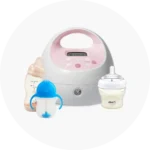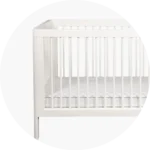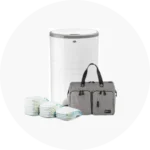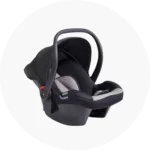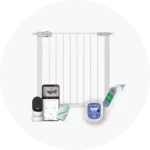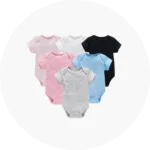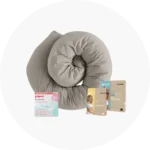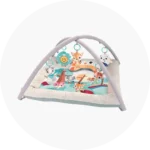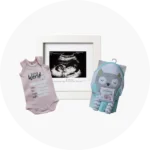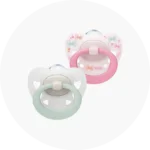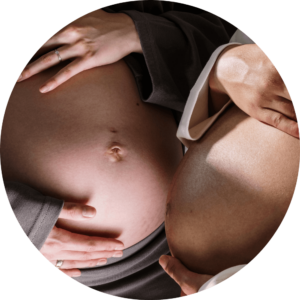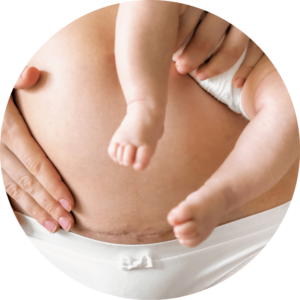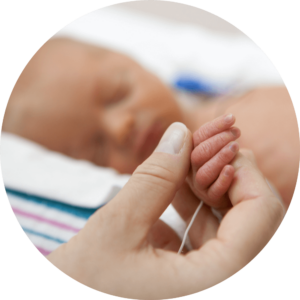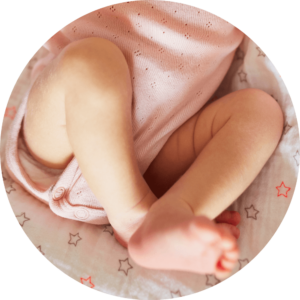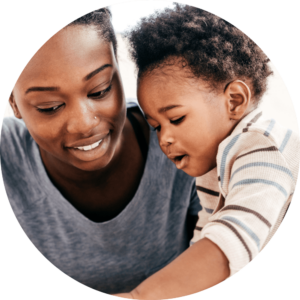The Ultimate Hospital Bag Checklist
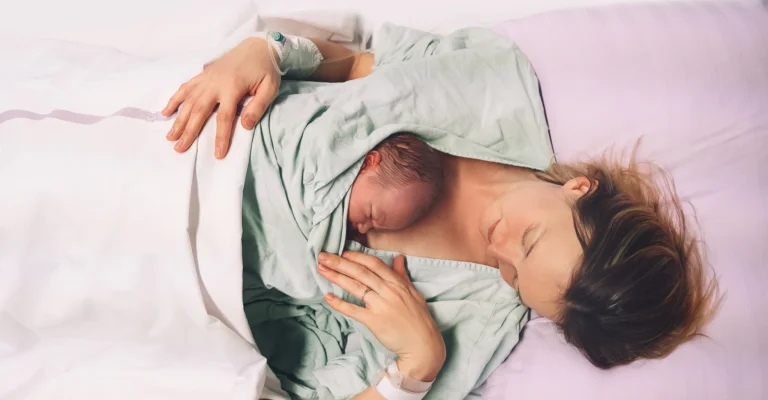

Last Updated: 10 November 2024

Table of Contents
Going to the hospital or birthing centre for your delivery is very exciting, but also very stressful. You need to make sure you remember everything that you need, while also not filling 2 whole suitcases. It can also be hard to decide what to pack in your bag, especially as a first time parent. So, we’ve made this checklist to make it just a bit easier for you. This checklist is very broad, so please tailor it to your unique needs.
We recommend you have your bag packed around 2 months before your estimated due date. This means you’ll be prepared if anything unexpected happens. Keep your bag in an accessible place, so that if you are unexpectedly admitted, your partner or a loved one can fetch it for you.
Private Hospitals
Most medical aid schemes cover a hospital stay of two nights following a natural delivery. If you’ve had a Caesarean section, your stay will typically be three nights. During this time, both you and your baby will be cared for in the Obstetrics Unit by specially trained nursing staff, midwives and medical specialists. Your obstetrician will visit daily, and the nursing staff will assist you in becoming familiar with your new baby’s needs, guiding you on the best ways to care for them.
Public Hospitals
Most mothers are discharged from hospital (if there are no concerns) around 6 hours after a natural delivery, but you may need to stay longer if you or your new baby need any further care If you have a Caesarean section, you will likely spend two to three nights in hospital. During this time, you and your baby will be looked after by nurses and midwives, as well as obstetricians, obstetric registrars and intern doctors.
Most hospitals encourage you to leave valuables and jewellery at home, as there are may not be any secure places to lock away these items while at the hospital.
Each hospital or centre is different, and may provide different items. Some common items that they may provide are linen savers and maternity pads. When you plan your admission, you should receive advice about what you would need to bring and what they will provide.
Birthing Parent
As you prepare for the arrival of your little one, packing the perfect hospital bag is key to making the experience as smooth and comfortable as possible for the birthing parent. This section is all about ensuring mom has everything she needs to feel supported and at ease, from labor through recovery. Whether it’s cozy socks, nourishing snacks, or personal care items to help her feel refreshed, having these essentials on hand can make a big difference. Let’s dive into what you should pack to help her feel her best during this special moment.
Clothing
Quantity Recommendation – Pack 1-2 for each day you will be in hospital
- Bottoms
Loose, comfortable, soft pants can provide much-needed comfort after birth. Opt for something high waisted especially if you have a C-section.
- Tops or Nighties
Front-opening tops or nighties will be a life-saver for late night feedings
- Zip up Hoodies
The hospital can sometimes be a bit chilly
- Going Home Outfit
Most of us do not look like Kate Middleton after birthing a baby. Opt for something that makes you feel comfortable and human.
- Socks
- Slippers
- Slip-Slops
Shared shower floors are a no-no. Bring some shoes to keep your feet safe at the hospital.
- Maternity Bras
While nursing bras are necessary, we recommend that you get cheaper ones for during your pregnancy and invest in more expensive drop cup ones after birth, when you know the “true” size of your breasts for the coming months.
- Underwear
Pack three pairs for each day, choosing ones you don't mind getting ruined. Whether you're having a C-section or a natural birth, you'll need hospital panties—either disposable or premium reusable ones.
- Dressing Gown
Warm, Cosy and Front Opening
- Labour And Delivery Gown
Some people feel more comfortable delivering in their own clothing.
Check-in with your hospital and OBGYN to see if this is permitted
Toiletries
- Shower Gel or Body Wash
- Skincare Regimen
- Hairbrush
- Hairbands or Scruchies
- Toothbrush & Toothpaste
- Deodorant
- Body Lotion
- Shampoo & Conditioner
- Bath Sponges or Wash Cloths
- Tissues
- Cronic Medication & Supplements
Pack all your medications and supplements in labeled Tupperware or plastic bags. You will likely need to hand these in at the ward.
- Large Bath Towel
The hospital will likely provide towelling but it is much nicer to have your own
- Eye Mask & Ear Plugs
Helps you get some rest in a noisy and bright maternity ward
- Toilet Paper
Hospital toilet paper may not be as soft as you would prefer.
- Hair Dryer & Heat Tools
- Makeup Bag & Mirror
- Glasses
- Contact Lenses & Solution
Tech & Documents
- Medical Aid Info
- Filled in Pre-Admission Forms
Depending on the hospital, you can fill in these forms digitally or physically.
- Medical Records
- Birth Plan
- OBGYN Contact Info
- Paediatrician Contact Info
- Phone
- Chargers
- Earphones
- Double Adaptor or Multiplug
Hospitals never have these readily available!
- Flip File
- Black Pen
Trust us - you will need this for filling in paperwork.
- Camera
- Camera Charger
During Labour
Labour and birth are highly personal experiences. Pack anything you’ll want to support yourself through this journey. We’ve put together some suggestions that consistently make an appearance in our 20 years of experience.
- Dark Coloured Face Cloths
- Lip Balm
- Massage Oil
- Massage Rollers
- Aromatherapy Oils
- Birthing Ball or Peanut Ball
- TENS machine
- Bluetooth Speaker
- Birthing Playlist
- Portable Fan
- Guided Meditation or Hypnobirthing App
- Night Light or Fairy Lights
Hospital lighting can often be very bright, which may not be ideal for the calm, soothing environment you want during labor. Consider bringing a soft, low-light option to create a more relaxed atmosphere. It’s also perfect for late-night feedings while you’re in the hospital, and you’ll definitely find plenty of uses for it once you’re home!
- Tablet, Ipad or Laptop
- Downloaded Movies & Series
- Water Spray Bottle
- Water Bottle
- Energade or Electrolyte Replacement Drink
- Snacks
Before eating anything during labour, check with the midwife or obstetrician to make sure it is safe. If you are at risk of needing an emergency Caesarean section, then they may want you to avoid eating anything.
- Mints
- Comfortable Pillow or Pregnancy Pillow
- Soft Blanket
- Extra Long Phone Charging Cable
Postpartum Care
For your postpartum care, it’s important to remember that every hospital is different. I highly recommend reaching out to the facility where you’ll be giving birth to find out what they provide, so you can plan accordingly and avoid overpacking.
Depending on the hospital, you may need to bring your own. We recommend you get them, and if you don’t use them, you can repurpose them at home or as on-the-go changing pads when out and about.
- Peri Bottle
Many hospitals offer some form of a portable bidet to support post-vaginal birth healing and recovery. However, you may want to invest in your own upside-down peribottle, which you can continue to use at home during the first few weeks for added comfort and hygien
Sentimental Items
Here are a few thoughtful ideas to help you celebrate the momentous occasion of your little one’s birth. This is a life-changing event, and it deserves something truly special to commemorate it!
- Personalised Baby Blanket
- No-Mess Stamp
- Baby Book
- Polaroid Camera
- Presents for Babies Siblings
For Baby
Many clinics and hospitals offer complimentary baby bags filled with essentials like disposable nappies and mini creams as part of their welcome pack. Before you start packing, check if this is available—it could save you from overpacking and give you one less thing to worry about!
Clothing & Blankets
Quantity Recommendation – Pack 1-2 for each day you will be in hospital. Not sure? go with 6 sets!
- Babygrows/Sleepsuits/Onesies
- Bodyvests
- Socks or Booties
- Going Home Outfit
PROTIP: Pack each set of clothing in a separate plastic bag. Used items can then be placed back in the empty bag to prevent any losses.
- Scratch Mittens
Newborns often have long, sharp nails that can accidentally scratch their delicate skin, especially their little face If your baby doesn’t like wearing them or they tend to slip off, some newborn clothing comes with built-in fold-over mitts
Baby Care
- Surgical Sprirts
- Soft Washcloth →
If you’re planning on using a dummy, we recommend bringing two different brands to test and see which one your baby prefers. Some hospitals prefer not allowing a dummy while in hospital, to encourage breastfeeding.
- Petroleum Jelly/Vaseline
This is a game-changer! Apply a layer of petroleum jelly to your baby's bum after birth to make cleaning up that sticky first poop (meconium) much easier.
Feeding
Some clinics and hospitals also offer complimentary baby bags with items such as disposable nappies, creams etcetera, as part of their welcome pack to you and baby. Confirm this before you start organising your bag. You will need the following items for your little one
Breastfeeding
- Harvested Colostrum
Some moms choose to harvest colostrum before birth to support their baby in the first few days. On the day you leave for the hospital, pack the frozen colostrum in an insulated cooler with ice packs to keep it frozen. Let the nursing staff know upon arrival so they can store it properly until needed.
Should I bring my breast pump to the hospital ?
Better to have it and not need it than need it and not have it. While your plan may be to breastfeed, your baby might have other ideas. Bringing a pump gives you extra flexibility in case you encounter any challenges. If possible, pack your pump and all necessary parts in a separate bag and leave it in the car. If needed, your birth partner or a friend can easily fetch it for you
Pumping
Bottlefeeding
Should I bring formula to the hospital ?
This depends on the hospital you're delivering at, as many do not provide formula. To be prepared, we recommend bringing your preferred formula just in case. This ensures you can start feeding with the formula you've chosen, rather than having to switch once you return home. Always check with your hospital beforehand to know their policy.
Heading Home
- Installed Car Seat
Many hospitals will not allow you to leave without an installed car seat for your newborn. To avoid any last-minute stress, we recommend installing the car seat a few weeks before your due date, just to be safe. This ensures you have time to familiarize yourself with its setup and proper usage, giving you peace of mind as the big day approaches.
- Window Sun Shades
- Extra Bag
Pack an extra bag to help with all the bits and bobs you’ll inevitably accumulate during your hospital stay.
For Birth Partner
As a birth partner, your role is crucial in providing support and comfort during labor and delivery. One of the best ways you can prepare is by packing a well-thought-out hospital bag that’s ready for anything. While the birthing parent focuses on bringing your little one into the world, you’ll want to be organised and equipped to meet their needs and your own. From practical essentials like snacks and chargers to items that will help you stay comfortable during a potentially long stay, being prepared allows you to fully focus on supporting your partner.
- Tops
- Bottoms
- Hoodie
- Underwear
- Socks
- Comfortable Shoes
- Body Wash or Soap
- Toothbrush & Toothpaste
- Shampoo & Conditioner
- Deodorant
- Medications or Suppliments
- Phone
- Phone Charger
- Double Adaptor or Multiplug
- Blanket
- Travel Pillow
- Anything you think mom might forget
- Drafted Birth Announcement
Our pro tip: Create a WhatsApp community or group with all the important people you and the birthing parent want to keep in the loop with updates. This way, everyone stays informed without you needing to send multiple individual messages. You can even draft a birth announcement message beforehand, so that’s one less thing to worry about on the big day.
- Snacks
- Water Bottle
- Tablet, Ipad or Kindle
- Chargers
- Push Present
Our Guidance Pledge
We’re dedicated to providing you with practical, evidence-based information to help you make the best choices for your growing family. All content is medically reviewed by our in-house doctor and/or experts such as OB-GYNs, doulas, and midwives, and is based on the latest international guidelines, peer-reviewed studies, and reputable sources from academic institutions and medical journals.
